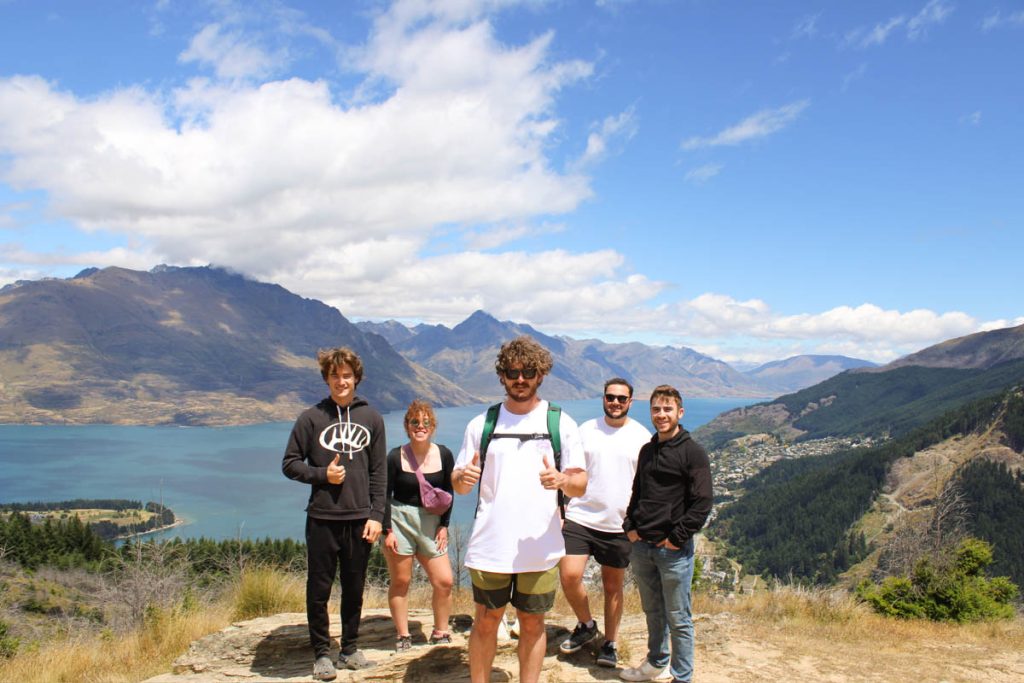Culture, Agriculture, Food and Natural Resources

Experience the natural beauty of New Zealand while being introduced to the culture, agriculture and natural resources of the area! The program allows students to explore New Zealand’s north and south islands. South island activities include an introduction to Māori culture and site visits to understand New Zealand’s emphasis on the environment, arable farming, livestock and dairy production, the wine industry and tourism. Tours will be arranged to see farms, orchards and vineyards, production facilities for wine and spirits, deer farms, natural wonders, cultural sites, Antarctic Centre and the viewing of Blue Penguins waddling ashore.
The north island offers meetings with New Zealand government and producer representatives. There will be additional visits to production facilities plus planned stops at Hobbiton and Rotorua for a Māori hangi. The time in Auckland will include a visit to a creamery and winery with a full day of free time to take in some big-city experiences such as Auckland’s Sky Tower, War Memorial Museum, Kelly Tarlton’s Sea Life Aquarium, Waiheke Island, Rangitoto Island or Mt. Eden.
Quick Information
| Application Due | Oct. 1 |
| Academic Date | Dec. 28, 2025 – Jan. 17, 2026 |
| Credit Hours | 3 |
| Requirements | 2.5 MU GPA at time of application, good academic standing, open to all MU students. |
| Estimated cost | $6,421* (doesn’t include airfare) |
| Contact | Shanon Dickerson, Director of International Study Programs |
Location
Since it is in the Southern Hemisphere, the seasons are shifted from those in the U.S.A. Therefore, since the program takes place during our winter, it is summer in New Zealand. The average high temperature in Christchurch in January is 71 and the average low is 54. In terms of the time difference, in January, when it is 1 p.m. on Wednesday in Missouri, it is 8 a.m. on Thursday in New Zealand.
Accommodation and Meals
Students will be housed in a combination of hostels, hotels and other accommodations. Rooms will be shared, and the number of participants in a room will vary from location to location. In some cases, students will have only a single roommate in one location, but three or more in another location. Most bathrooms will be shared, community facilities. Students should plan to bring their own towels. All housing costs are included in the program fee.
A detailed itinerary will be provided that clearly indicates which meals will need to be purchased by students. Students will be responsible for meal costs not included in the fee. Though the individual spending habits of each student will vary, please see the budget information below for an estimate of the average out-of-pocket meal expenses.
Program Travel
New Zealand requires an electronic travel authorization (NZeTA) for entry for US citizens and citizens from a country with a visa waiver agreement. A visitor visa may be required for citizens from a country without a visa waiver agreement. There is also an International Visitor Conservation and Tourist Levy (IVL) to enter as a visitor (approx. $65 USD).
International round-trip air travel will be arranged for the New Zealand group. This arranged flight generally departs from and returns to Lambert International Airport in St. Louis, MO. Transportation to Lambert International Airport will be the responsibility of the student. The faculty program leaders, Andrew Clarke, Ph.D., and Jon Simonsen, Ph.D., travel with the group flight to facilitate airport check-in and transfers. Because of the fluctuation in airline prices, the airfare estimate is listed separately below; however, once group reservations are made and the flight is finalized, the ticket cost will be added to the program fee and billed to participants’ MU accounts.
All in-country program travel is organized by CAFNR and is included in the program fee. Some individual local transportation costs may be accrued by students wishing to explore program locations independently during their free time.
Academics
Students will be enrolled in three credits of AFNR 2191: International Agriculture, Food and Natural Resources (humanities; graded A-F) for the spring semester. Students should work with their advisors to determine how these credits will count toward their individual graduation plans.
While in New Zealand, students are required to keep journals about their experiences and are also given journal topics to turn into the accompanying CAFNR faculty. Students are also required to compile a portfolio with pictures and comments discussing what they have seen and learned in New Zealand and how it compares to their experiences in the United States.
Please be aware that there will be at least 4 mandatory orientation sessions prior to departure. The majority of these meetings will occur in the fall; late October and throughout November. Dates and times for the meetings will be available shortly after the confirmed program participant list is finalized, generally around mid-October. Participants will be notified of the meeting details via email.
Estimated Cost
MU Tuition (3 Credits; Spring Semester): Varies per student. See website for details.
| Non-refundable deposit: | $350 |
| Intl Center Fees: | $245 |
| Program Fees: | $5,826 |
| Total cost estimate without airfare: (includes accommodation and some meals) | $6,421 |
| Airfare estimate: | $2,500-2,800 |
| Additional meals estimate: | $500-750 |
| Additional misc. estimate: | $500 |
Special Considerations
Students can expect to walk in fields and tour manufacturing facilities. Substantial time is spent traveling by coach on narrow roads in hilly terrain. Exposure to animals is expected. Animals include sheep, dairy cows and sheep dogs. Temperatures typically are from 65 to 85 degrees. Walks are expected to be less than a mile per day with the group, but individuals have free time to make more extended walks to explore cities at their leisure.
Exposure to bees may occur but there are no snakes or wild animals of concern in New Zealand.